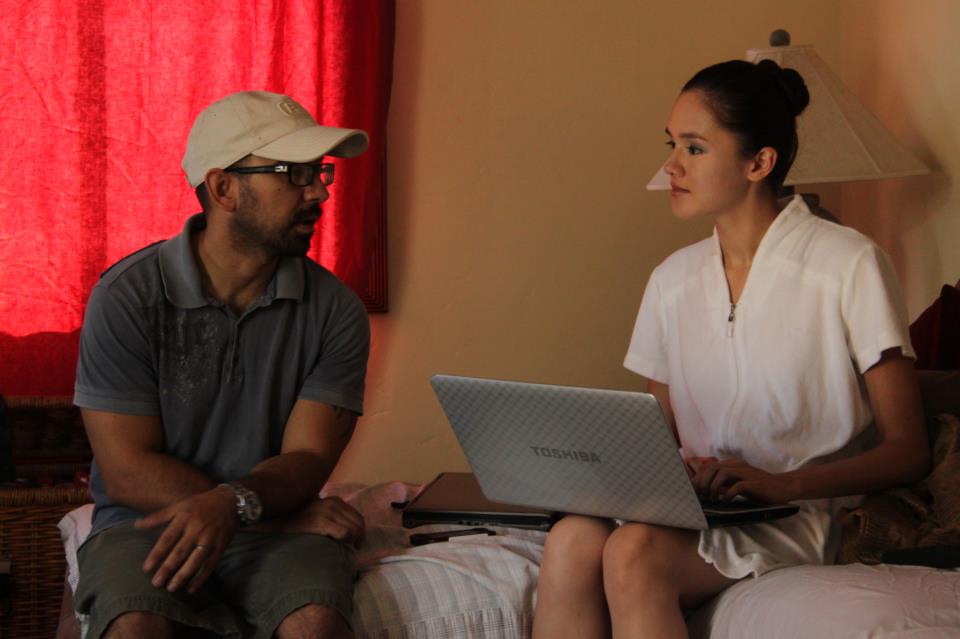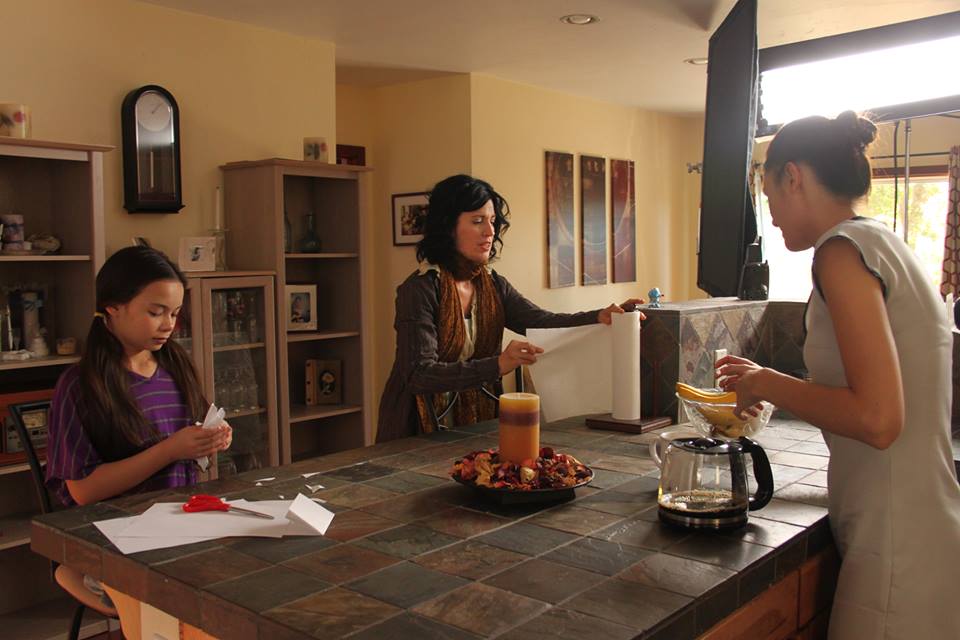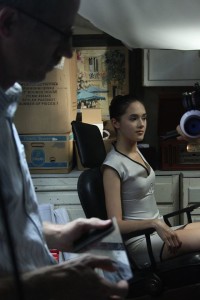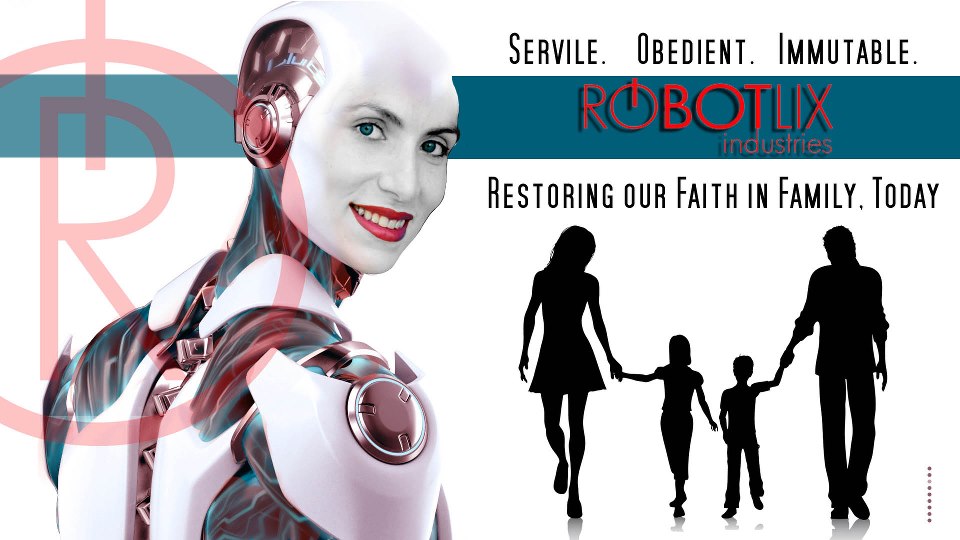 “Servile, Obedient, Immutable – Characteristics you’ve come to associate with the Robotlix Server Series. But how about compassion, empathy, love?”
“Servile, Obedient, Immutable – Characteristics you’ve come to associate with the Robotlix Server Series. But how about compassion, empathy, love?”
The year is 2022. Company spokesman Robert Watson (Jesse Hettig) says it well enough to be quoted, with classic infomercial style: “Robotlix patented breakthroughs in servo-cognition were just the beginning of our evolution as the premiere leader in domicile and custodial robo-synth technology. And today, we continue that mission with the latest member of the Robotlix family – the LC-9000 Server Bot, or simply Luc-E.”
In LUC-E, the technology has advanced to that ultimate apex of human achievement and creation–androids that not only function and serve humans, but also show “compassion, empathy, and love” like humans. Yes! It was Philip K. Dick who asked the foreboding question in 1968 that comes to mind here: “Do androids dream of electric sheep?” In the year 2022, they are doing much more, probably dreaming real sheep. As much as that sounds wonderful to some, Luc-E shows us that, therein, also lies the height of reasons to be fearful…as well as the plot of an effective new sci-fi/horror short from writer/director Donny Herran.
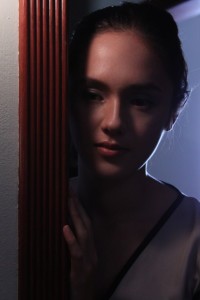 Actor, vocalist, and model Rachel Li stars as the prototype android and subject of our sci-fi scenario. She is programmed to serve humans, and “restore our faith in family.” But, what is the twist in this temporal tale with a lesson, making advertised abilities ominous? Yes! Just as the plot needs, something about Luc-E’s programming isn’t quite right. An unknown “system error” is the culprit, with certain stimuli setting it off. What’s the solution? Company employee Allen Adams (Michael Massei) is charged with watching the new android in his home, allowing her to “understand” and develop her emotions within the necessary context of a family. Hopefully, her “error” will work itself out. Hopefully, it’s just a glitch. Hopefully, the LC-9000 will be the Server Bot to replace all others? Hopefully, the goal of restoring faith in family…today” is realized without incident. Before agreeing, think again! Would you really ask for something so simple and harmless in a sci-fi film about androids and the future? Seriously? One way or another, the results seem foreboding as well as uncertain from the start. Assimilating and understanding emotions within a dysfunctional family may be a job too large (and too dangerous) for even the most advanced technology. Humans may, in fact, be the worst example for anything to mimic!
Actor, vocalist, and model Rachel Li stars as the prototype android and subject of our sci-fi scenario. She is programmed to serve humans, and “restore our faith in family.” But, what is the twist in this temporal tale with a lesson, making advertised abilities ominous? Yes! Just as the plot needs, something about Luc-E’s programming isn’t quite right. An unknown “system error” is the culprit, with certain stimuli setting it off. What’s the solution? Company employee Allen Adams (Michael Massei) is charged with watching the new android in his home, allowing her to “understand” and develop her emotions within the necessary context of a family. Hopefully, her “error” will work itself out. Hopefully, it’s just a glitch. Hopefully, the LC-9000 will be the Server Bot to replace all others? Hopefully, the goal of restoring faith in family…today” is realized without incident. Before agreeing, think again! Would you really ask for something so simple and harmless in a sci-fi film about androids and the future? Seriously? One way or another, the results seem foreboding as well as uncertain from the start. Assimilating and understanding emotions within a dysfunctional family may be a job too large (and too dangerous) for even the most advanced technology. Humans may, in fact, be the worst example for anything to mimic!
“I am programmed to interpret and mimic human behavior and emotions. In order to do so, I must understand them.” ~ Luc-E
The first sign that something is wrong with Luc-E occurs when she malfunctions while watching a toy robot with a Lost-in-Space-style voice, saying “Danger!” (No, not followed by “Will Robinson.”) What’s the malfunction? Imagine a spastic robot on steroids, with looks to kill, literally and figuratively. (Yes! I guess you call her the ultimate in dangerous beauty!) Before you think, “dumb move” keeping a killer robot with a family, think again. Luc-E’s malfunctions are in no way known to be what we see in our mind, looking for the worst–the ever-horror-loving movie fan, as opposed to the ever-optimistic seekers of profit. Yes! Art mimics life here, as faithfully as ever!
Later, when Allen rips a photo of himself with his wife and daughter in half, we know that something isn’t right at home with the humans either. Plus, the relationship between Allen’s daughter Hallie (yes, I’m going to spell it that way for now for reasons to understand later) and his wife Alice (whose name I will again spell incorrectly for the same reason) is mystified by the cold and callous attitudes they have for one another. (Yes, this is not your typical mother/daughter relationship, even for a girl of Hallie’s age.) They are, as an ironic contrast, more emotionless and “robotic” than the actual robot – the Luc-E. A compelling human mystery with a great twist is added, saving a robot story from sci-fi cliché. The result is more depth and complexity to be discovered!
“These bots are more sensitive; they need real settings to assimilate themselves, otherwise they develop the personality of a toaster.” ~ Allen Adams
Gabriella Pastore plays Hallie like a pro, acting with skill well beyond her age. Her emotions are controlled with a sense of pensiveness, perfect for her character (as you will see), making Hallie believable for who she is, ultimately. What at first seems like a restrained performance is, in the end, spot on for the Hallie that’s revealed. Plus, Hallie’s solemn moments make her character a bit creepy as well. Of course, ominous children in horror and sci-fi are always added bonuses; thanks to Pastore, the bonus is added well. Many younger actors would overact such parts, being too pretentious and self-aware, ruining the realism; however, Pastore plays it just right, nailing the needed performance. She is appropriately “distant” and “unresponsive” to her mother’s “commands” (to use android language), but infused with life by the android–another ironic and clever story element that Pastore delivers with a slam dunk. For Pastore, there is surely much more on the horizon, and Space Jockey Reviews looks forward to seeing the places she will go! Strap on your seat belts, Gabriella! You’re ride to the future looks out of this world!
plays Hallie like a pro, acting with skill well beyond her age. Her emotions are controlled with a sense of pensiveness, perfect for her character (as you will see), making Hallie believable for who she is, ultimately. What at first seems like a restrained performance is, in the end, spot on for the Hallie that’s revealed. Plus, Hallie’s solemn moments make her character a bit creepy as well. Of course, ominous children in horror and sci-fi are always added bonuses; thanks to Pastore, the bonus is added well. Many younger actors would overact such parts, being too pretentious and self-aware, ruining the realism; however, Pastore plays it just right, nailing the needed performance. She is appropriately “distant” and “unresponsive” to her mother’s “commands” (to use android language), but infused with life by the android–another ironic and clever story element that Pastore delivers with a slam dunk. For Pastore, there is surely much more on the horizon, and Space Jockey Reviews looks forward to seeing the places she will go! Strap on your seat belts, Gabriella! You’re ride to the future looks out of this world!
Sevannah Zelocchi plays Alice, the epitome of the woman every man wishes his wife does not become. Alice is bossy, domineering, and insistent on having her way, with no regard for the feelings and responsibilities of her husband. She says that talking to him is like “talking to a robot,” while talking to her is like talking to a human–in this case much worse! When Allen brings home Luc-E, Alice even goes to the extent of being jealous and suspicious of his sexual intentions. (Alice actually uses a security camera to keep her eye on the “toaster,” as she refers to Luc-E.) Hopefully, none of this sounds familiar to you, minus the androids. (I pity you, if it does.) Normally, I don’t inject social commentary into my reviews; however, this plot detail is surely personal and social, no matter how you “program,” hitting home with more than a few viewers of Luc-E. (For me, long-dead nightmares were revived with adrenalin!) I applaud Zelocchi for giving her character, Alice, a force of realism that stands out, clashing with efforts at “restoring faith to family,” perfecting the irony. With Zelocchi’s performance, Luc-E sets the mood it needs and hangs on.
“Love is about compassion, companionship, trust, and forgiveness. Love is about giving someone something they need most.” ~ Mrs. Adams
Connections with the viewer are always effective, and this movie makes them well, scoring more points with the irony in Alice’s quote above. (Is this deficiency in humanness, or proficiency in something less?) With her shrewlike behavior early on, it’s not totally surprising (but fully intriguing) that Allen rips her image from the photo. This makes the viewer wonder what else he may do, and specifically, what he may do to Alice. Allen is a hen-pecked, wife-dominated husband who seems to grow a spine! Imagine that…and the possibilities! Has he really grown a backbone, or is he hiding a dark, sad secret worse than the biggest android horror? Is he ripping Alice from the photo because she’s a shrew, for reasons unrelated, or both? Those are just a few of the many questions making Luc-E compelling to the end…and beyond.
Michael Massei, as the husband and father Allen Adams, is a major focus, exactly because he harbors so much of the film’s mystery. As is necessary, Massei does a standout job portraying a man with myriad troubles, as much in his mind as we see around him; he’s haunted by an unknown past, and plagued by unwelcome work and a cantankerous wife. To make matters worse, he has a daughter from whom he’s oddly detached or without the time to nurture and show attention. Until the mystery is revealed (which is until the end), Massei carries the weight of the movie, as the character we look to for answers–in his memories, his thoughts, his unsettled expressions, and actions–delivering another needed element. In his performance, we find a character with whom we can identify, remarkably. With the plot’s puzzle, Massei’s performance puts the pieces together with proficiency.
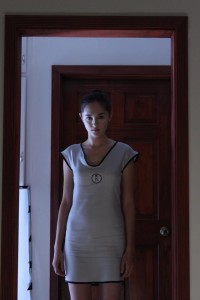 Of course, a key and exceptional performance that makes the movie is that of Rachel Li, as Luc-E. Li follows the OS necessary to make us believe that she is, indeed, an android and not a human. Yes, there is certainly no “error” in Li’s system, as she gives more than enough “artificial intelligence” to Luc-E. (Since Rachel Li is a vocalist, she also delivers an awesome operatic performance, to demonstrate her robotic humanness and hopefully bond with Hallie.) While some may think that playing a robot is easier than playing a human, as always, I say think again. Playing an android requires focus and precision–an ability to be the opposite of what one truly is, in the most inhuman way. Convincing the audience can be all the more difficult, with all eyes looking for just the certain “something” about androids. Li convinces us, on queue every time, being emotionless or seemingly happy, all while exuding the air of “danger.” Her smiles and expressions are steady, fake, and unsettling, not because it is easy, but because she has studied the art of being a machine. (A pensive android in a doorway is eerie, if not downright scary…and Li is scary!) What’s more is the movie’s clever comparison with the malfunctioning toy robot. Luc-E’s dysfunction is real and alive; the toy is not. Her “errors” are, ironically, reflections of those she serves; in Li’s skill as an actor, we, as viewers, see our reflection clearly, and such is the mark of her success. Such is also the mark of our folly. Yes! What would a movie about robots be, without a convincing android, as a tragic example of ourselves?
Of course, a key and exceptional performance that makes the movie is that of Rachel Li, as Luc-E. Li follows the OS necessary to make us believe that she is, indeed, an android and not a human. Yes, there is certainly no “error” in Li’s system, as she gives more than enough “artificial intelligence” to Luc-E. (Since Rachel Li is a vocalist, she also delivers an awesome operatic performance, to demonstrate her robotic humanness and hopefully bond with Hallie.) While some may think that playing a robot is easier than playing a human, as always, I say think again. Playing an android requires focus and precision–an ability to be the opposite of what one truly is, in the most inhuman way. Convincing the audience can be all the more difficult, with all eyes looking for just the certain “something” about androids. Li convinces us, on queue every time, being emotionless or seemingly happy, all while exuding the air of “danger.” Her smiles and expressions are steady, fake, and unsettling, not because it is easy, but because she has studied the art of being a machine. (A pensive android in a doorway is eerie, if not downright scary…and Li is scary!) What’s more is the movie’s clever comparison with the malfunctioning toy robot. Luc-E’s dysfunction is real and alive; the toy is not. Her “errors” are, ironically, reflections of those she serves; in Li’s skill as an actor, we, as viewers, see our reflection clearly, and such is the mark of her success. Such is also the mark of our folly. Yes! What would a movie about robots be, without a convincing android, as a tragic example of ourselves?
Writer/director Donny Herran has crafted an effective cautionary tale of technology gone amok, in a future that could well be our own. Despite warnings, the certainty of mistakes lies in free-market profit and late-night infomercials. Above all, defying the traps and clichés of the genre is, perhaps, Herran’s greatest achievement. What’s more is that it’s all done in less than 20 minutes, wasting no time getting to motherboard of the movie, so to speak! Excellent!
“I am curious. Is it difficult to care for someone who is inconsiderate of your own feelings?” ~ Luc-E
Does Luc-E’s glitch work itself out? Or, does the meddling of humans make it worse? Are real human emotions too much for an android to handle? Is authentic human behavior really not the best model for artificial intelligence? Is it too much for them to have free will in making decisions, in the grey area of “what is best,” with a program to protect as well as serve? Is human behavior in its purest form (or even as close as an android can mimic) possibly the worst “system error” of all? Can androids really be “servile, obedient, and …immutable?” I won’t answer these questions (and I can’t answer them all anyway), but I will leave them with you for thought. While all of the answers may not be in any one film, Luc-E is a good place to start! In the words of Allen Adams, “[This is] technology that fights our wars, runs our public works, and raises our children. When it “seems like [they’ve] answered every need a family could ever have,” be afraid. Be very afraid!
“Welcome to the future…today.” ~ Richard Watson
Check out the entire cast and crew of Luc-E on IMDb!
For all the latest movie news,”Like” Luc-E on Facebook!
Follow Rachel Li on Twitter @RachelEllenLi
“Like” Gabriella Pastore’s actor/director page on Facebook!
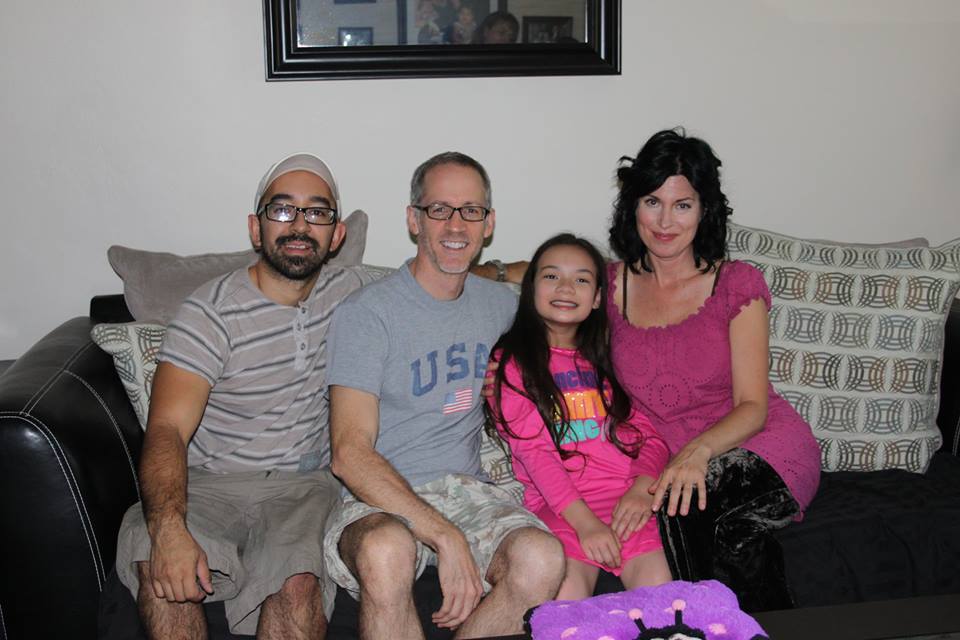
Donny Herran (writer and director), Michael Massei (Allen), Gabrielle Pastore (Hallie) and Savannah Zelocchi (Alice) taking a break
Chris Rennirt (the author of this review) is a movie critic and writer in Louisville, Kentucky, as well as editor in chief at Space Jockey Reviews. He has been a judge at many film festivals, including Macabre Faire Film Festival and Crimson Screen Film Fest, and he attends horror and sci-fi conventions often. Chris’ movie reviews, articles, and interviews are published regularly on Space Jockey Reviews and in Effective Magazine. His mission statement (describing his goals as a movie critic and philosophy for review writing) can be found on the “Mission” page, here at SJR. For more information about Chris Rennirt (including contact details, publicity photos, and more), click here.
You may also like these!
